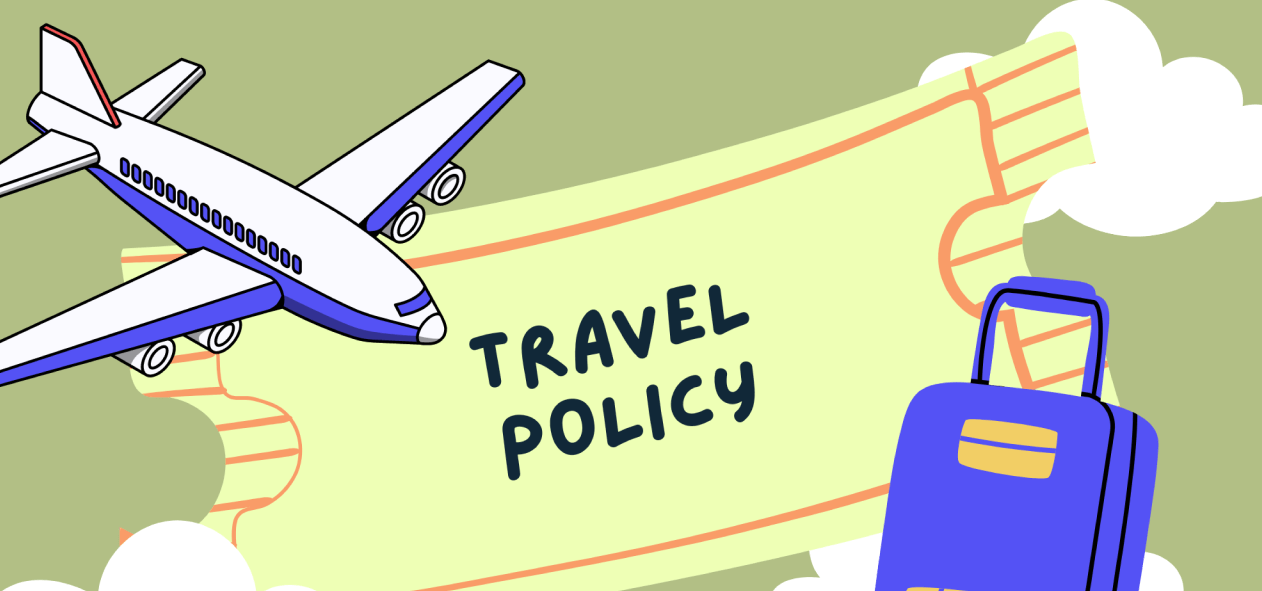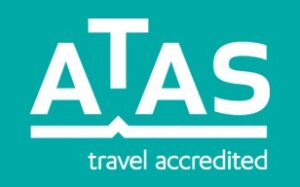Managing business travel becomes challenging without proper guidelines in place. Corporate travel policies establish the framework organisations need to standardise travel procedures, control costs, and ensure employee safety.
These documented guidelines outline how staff should book travel, what expenses your company will cover, and the procedures for reimbursement.
A well-designed travel policy does more than just control spending—it safeguards your business and your employees. For companies, these policies help maintain budget control, improve expense tracking, and ensure corporate travel compliance.
For employees, clear policies eliminate uncertainty about what’s permitted, streamline the reimbursement process, and provide security during their business trips.
What to Include in Corporate Travel Policies
Booking & Approval Procedures
Effective corporate travel policies must clearly define the booking process. Establish which booking platforms and travel agencies employees should use—preferably those with negotiated corporate rates. Many organisations require bookings to be made at least 14 days in advance to secure better rates, with clear guidelines for how this requirement adjusts based on trip urgency.
Your policy should outline a straightforward travel request and approval workflow. Specify who needs to authorise trips (direct managers, department heads, or finance teams) and what information travellers must provide when submitting requests. This creates accountability and helps with travel expense forecasting.
Even the most organised businesses face last-minute travel needs. Your corporate travel policies should include provisions for emergency bookings, including who can approve exceptions and what documentation is required.
They should also include guidance on handling flight cancellations and how employees should proceed when delays occur.
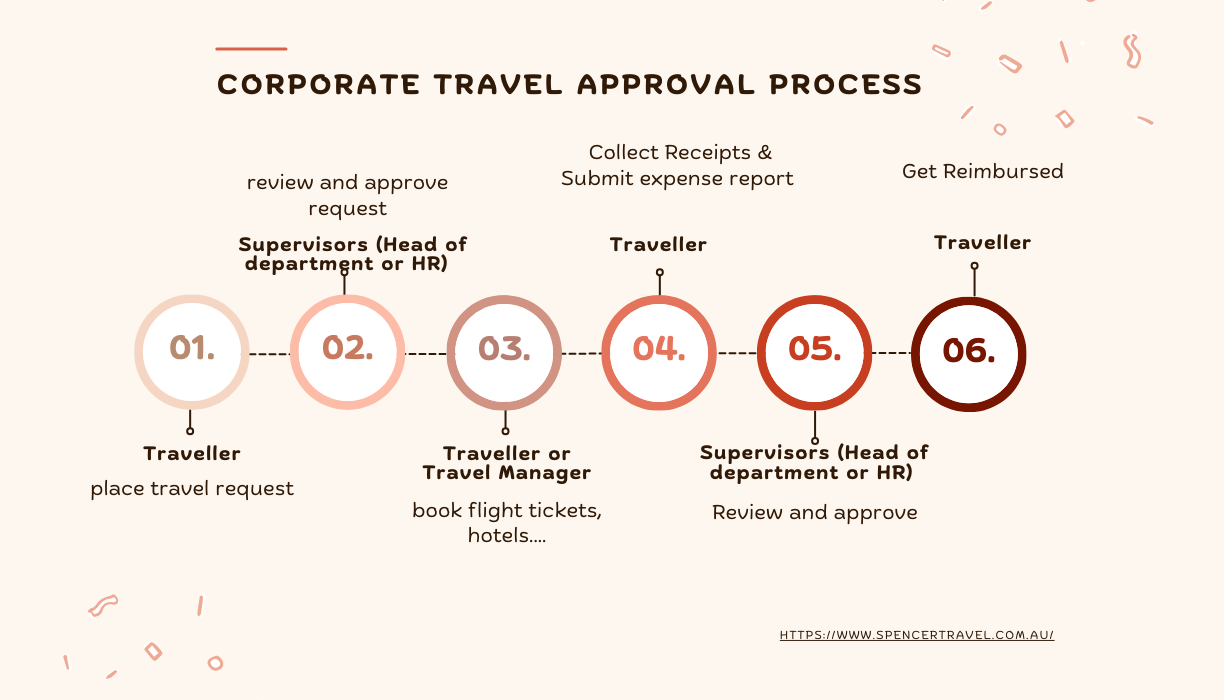
Travel Expenses & Reimbursement Guidelines
A comprehensive policy distinguishes between eligible and non-eligible expenses. Clearly specify what your company covers—typically flights, hotels, ground transportation, and meals—and what falls outside policy boundaries, such as personal entertainment, alcohol, or premium upgrades.
Detail the reimbursement process with specific documentation requirements. Your corporate travel policies should state what receipts employees need to submit, in what format, and the deadline for expense submissions after any corporate travel trip or bleisure travel completion. Many companies now use digital expense reporting tools to simplify this process.
Address how employees should handle expenses, whether through corporate credit cards or personal funds with later reimbursement. Define when company cards should be used versus personal payment methods, and provide training on any expense reporting software your organisation utilises.
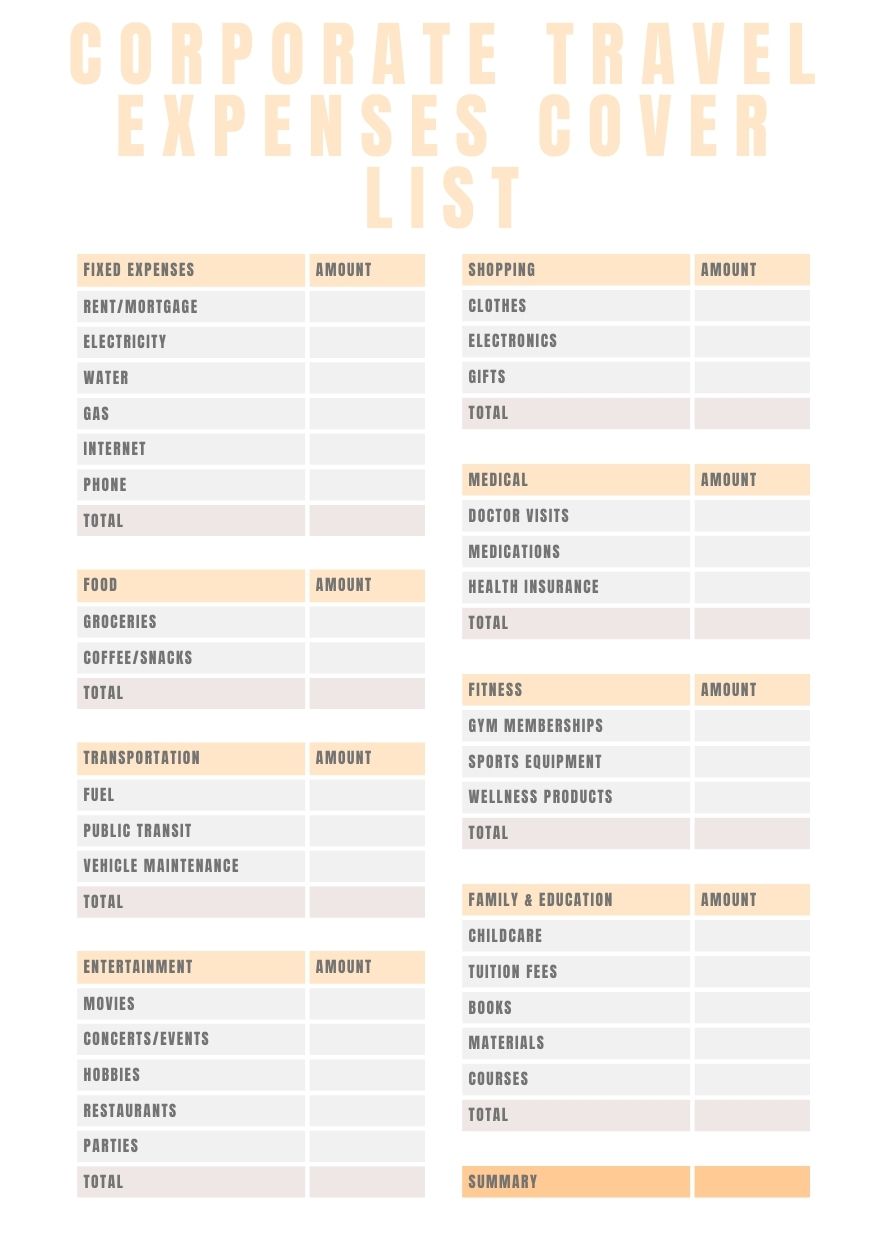

Accommodation & Transportation Rules
Set clear standards for lodging in your corporate travel policies. List preferred hotel chains where your company may have negotiated rates, and establish reasonable spending limits based on location. Your policy should also address whether alternative accommodations like Airbnb are permitted and under what circumstances.
Transportation guidelines form another critical component of effective corporate travel policies. Define when economy versus business class travel is appropriate, typically based on flight duration, employee seniority, or international travel status. Outline policies for hire cars, including size restrictions and insurance requirements, versus when employees should use ride-sharing services.
For ground transportation, specify which local travel options qualify for reimbursement. This includes taxis, rideshare services, airport shuttles, and public transportation. Consider including guidance on when to choose cost-effective options like public transit versus convenience-focused services like taxis.
Per Diems, Allowances & Expense Limits
Your corporate travel compliance framework should address how daily expenses are managed. Some companies prefer per diem allowances that provide a fixed daily amount for meals and incidentals, while others reimburse actual expenses up to certain limits. Explain how these allowances adjust based on location, recognising that costs vary significantly between domestic and international destinations.
Establish reasonable spending caps for common expenses. Set hotel nightly rate limits by city category, meal spending thresholds by meal type, and guidelines for additional costs like internet access or parking. These limits help control overall travel spending while giving employees clear expectations.
Include a section on how to handle situations where policy limits need to be exceeded. Define the approval process for special circumstances, such as travel to high-cost cities or during peak seasons. Also, outline the consequences of policy violations, which might range from denied reimbursement to formal disciplinary action for repeated offences.
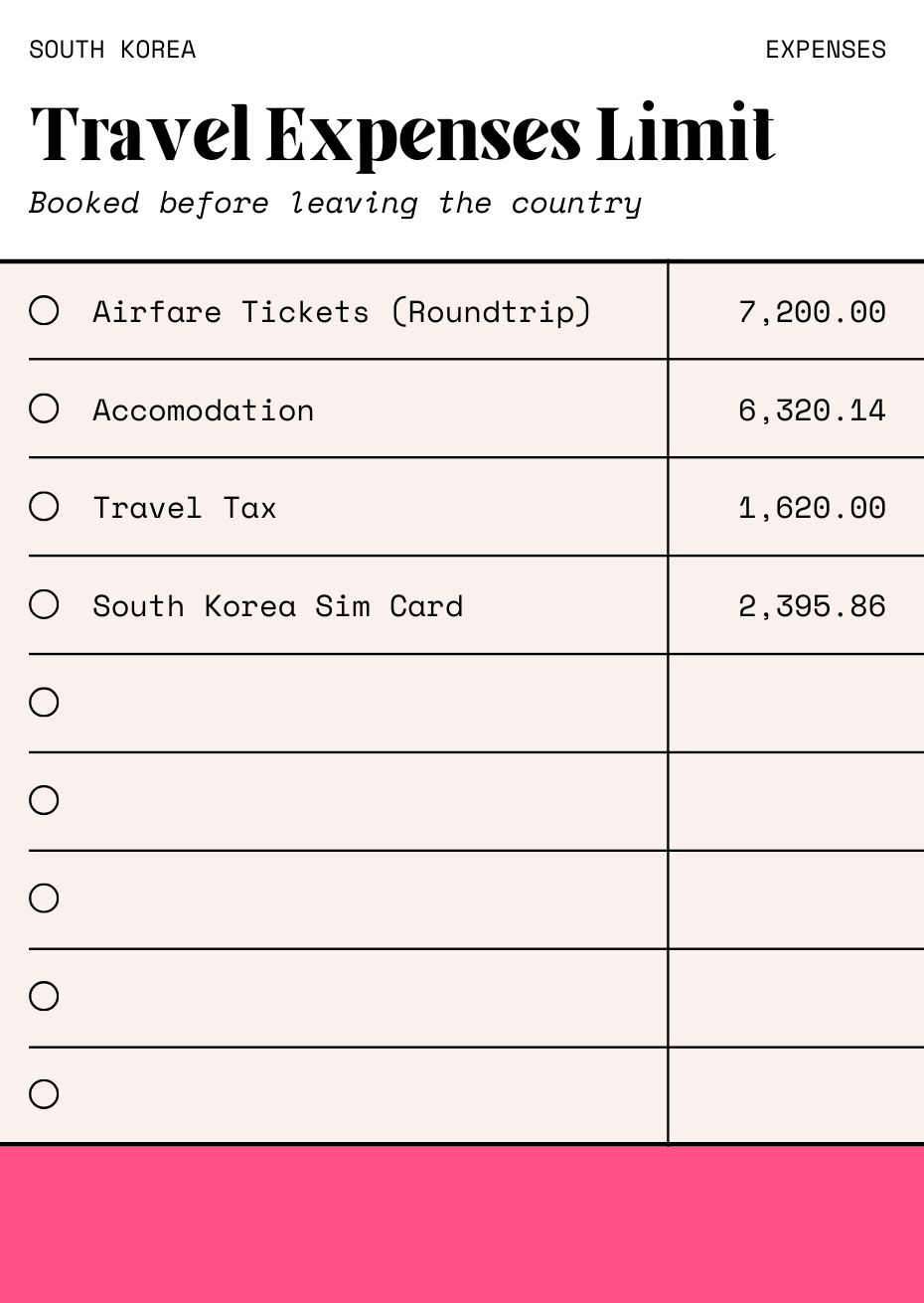

Travel Safety & Risk Management
Corporate travel policies must address your company’s duty of care responsibilities. Provide emergency contact information and describe the support available to travellers in crisis situations. Document procedures for various scenarios, from minor travel disruptions to major emergencies.
Provide details of the protection your corporate travel insurance provides. Clarify coverage for medical emergencies, trip cancellations, and lost belongings. Also, explain what additional coverage employees might need to secure personally, especially for international travel.
Include health and security guidelines in your corporate travel policies. For international trips, specify vaccination requirements and health precautions employees should take before departure. Add cybersecurity protocols to protect company data while travelling, such as using VPNs and avoiding public Wi-Fi for sensitive work.
Bleisure Travel & Personal Extensions
As work and personal travel increasingly overlap, your corporate travel policies should address ‘bleisure’ travel—adding personal days to business trips. Clearly outline how costs should be divided between the company and employees when trips include personal time. Explain the process for requesting extended stays and any limitations on using business trips for personal extensions.
Address liability considerations during personal extensions. Specify whether company travel insurance extends to cover personal days and under what conditions. Your policy should also clarify whether employees can leverage corporate travel discounts for personal portions of their trip and any applicable restrictions.



Policy Development & Implementation
Creating effective corporate travel policies requires a thoughtful approach. Start with a framework that addresses all essential categories, then customise it to your company’s needs and culture. Involve key stakeholders during development, including finance, HR, frequent travellers, and management, to ensure the policy balances all perspectives.
Different industries have unique travel requirements. Small businesses might need more flexible corporate travel policies than large corporations with established vendor relationships. Consider industry-specific compliance requirements, such as government contracting rules or healthcare regulations, that might affect travel reporting.
Even the best corporate travel policies only work when properly communicated and enforced. Develop training materials that explain policy rationale and procedures in clear terms. Implement regular compliance monitoring and reporting to identify patterns of non-compliance and opportunities for policy improvement.
Maintaining Corporate Travel Compliance
Consistent enforcement of your travel policy builds a culture of compliance. Create a system that flags exceptions automatically, whether through your booking tool or expense management system. Regular audits help identify trends and potential issues before they become significant problems.
Keep your corporate travel policies current by reviewing them at least annually. Travel industry practices evolve, as do company needs and market conditions. Update policies to reflect new vendor relationships, changing company priorities, and emerging travel risks.
Consider how technology can enhance corporate travel compliance. Modern travel management platforms can enforce policy at the point of booking, while automated expense tools can flag out-of-policy submissions. These technical solutions complement rather than replace clear policy guidelines.

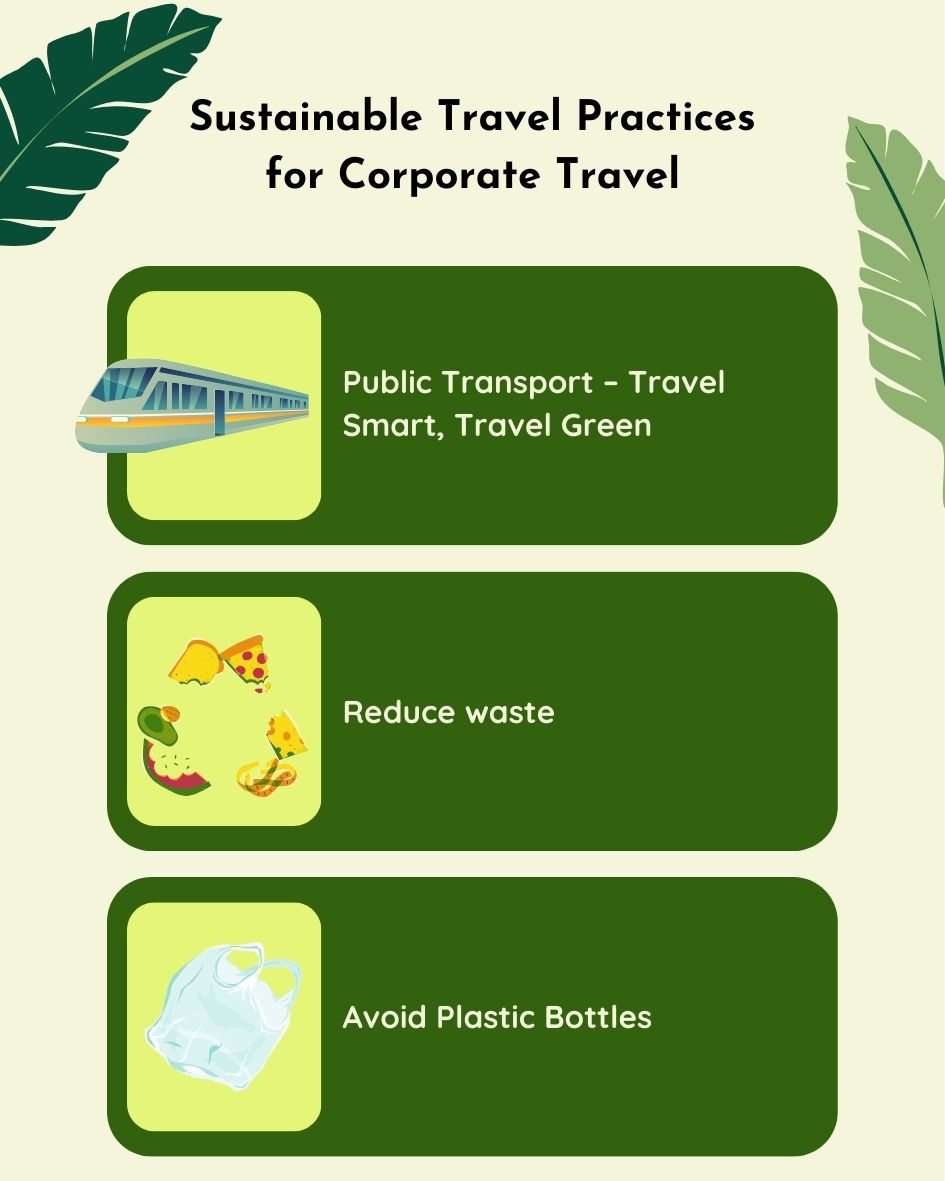
Sustainability and Corporate Social Responsibility in Travel
As environmental concerns grow globally, corporate travel policies should now address sustainability initiatives. Many Australian companies have begun incorporating green travel practices into their corporate travel policies to reduce their carbon footprint and demonstrate social responsibility.
This might include prioritising direct flights over connections to reduce emissions, selecting accommodation with recognised environmental certifications, and encouraging the use of public transport or electric vehicles when appropriate.
Your policy can establish guidelines for carbon offsetting programs, either as mandatory company practice or as an option that travellers can select during booking. Some organisations allocate a specific budget for sustainability initiatives within their travel program, while others partner with environmental organisations to offset their travel impacts systematically.
Beyond environmental concerns, modern corporate travel policies often address broader social responsibility issues. This sustainability in corporate travel includes selecting suppliers with fair labour practices, supporting indigenous-owned businesses where possible, and ensuring accessibility considerations for travellers with disabilities. Your policy might outline preferred vendors who align with your company’s values and social responsibility goals.
Implementing sustainable travel practices doesn’t necessarily mean increased costs. In fact, many environmentally friendly options—such as video conferencing instead of short trips, or selecting accommodation within walking distance of meeting locations—can result in significant savings while aligning with corporate social responsibility objectives.
The Bottom Line
Effective corporate travel policies strike the right balance between controlling costs and providing a positive experience for business travellers. They reduce financial risk through clear spending guidelines while improving compliance through straightforward procedures during . Most importantly, they demonstrate your company’s commitment to supporting employees during corporate travel whether it’s event travel, group travel or event bleisure travel while maintaining necessary financial controls.
Remember, the best corporate travel policies evolve over time based on practical experience and changing business needs. By regularly reviewing and refining your approach to business travel management, you create a system that truly serves your company’s financial interests and employees’ needs while travelling.

